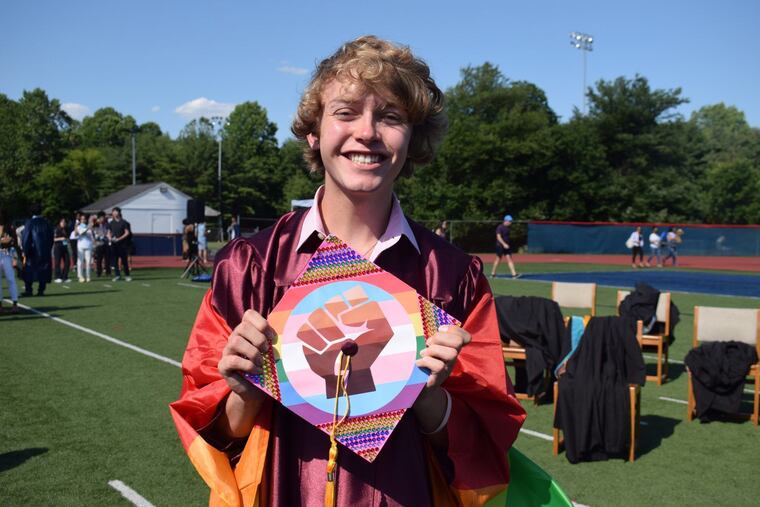Voorhees valedictorian’s mic cut during graduation speech while talking about being part of the LGBTQ community
The district’s superintendent denied asking any student to remove their personal identity from their graduation speech. Dershem called it censorship.

A South Jersey valedictorian had his microphone cut out and his notes crumpled on stage by his principal during his high school graduation speech when he began to touch on his experience as a member of the LGBTQ community.
Bryce Dershem, who graduated from Eastern Regional High School in Voorhees on June 17, had begun to discuss self-discovery when he mentioned coming out to his family and classmates in the ninth grade.
“After I came out as queer freshman year, I felt so alone. I didn’t know who to turn to for support,” Dershem said, just before his microphone was cut.
In a video posted on YouTube by Dershem’s father, Eastern Regional High School principal Robert Tull is seen grabbing Dershem’s speech from the podium while replacing the microphone with a working one.
Dershem, who will be attending Tufts University in the fall, told The Inquirer that Tull took his speech and “crumpled it up into a ball in front of me,” a moment visible in the video. Then Dershem said Tull pointed to a preapproved speech “they had essentially written for me and said, ‘You read this, or nothing else.’ ”
“At this point I’m about to cry,” Dershem said.
In a statement, Eastern Camden County Regional School District superintendent Robert Cloutier said that the district had not asked any students to remove “their personal identity” from their speeches.
“Every year, all student speakers are assisted in shaping the speech, and all student speeches — which are agreed upon and approved in advance — are kept in the binder on the podium for the principal to conduct the graduation ceremony,” Cloutier said.
Addressing the content of Dershem’s speech, Cloutier said that the district “focused on social-emotional wellness for the year’s reopening plan” and is “committed to the diversity and inclusion initiatives” of the New Jersey Department of Education.
Leading up to graduation, Dershem said he attempted to work with administrators to craft a speech that could speak to his personal experiences while offering a hopeful and inclusive message. Two days before graduation, he was asked to remove all references to “queerness” and mental health issues that he worked hard to cope with and overcome.
“They said that if I used any sort of discussions on LGBTQ matters, that I would just exclude people,” Dershem said. “But that wasn’t really my message at all, and I don’t think it really is exclusionary to say that one is queer.”
So Dershem came to the graduation ceremony prepared: He had his seven-minute speech memorized, and after Tull walked away from the podium Dershem composed himself, spoke into the now-working mic, and continued where he left off.
“As I was saying,” Dershem said to the cheers of his classmates and the parents in attendance.
Dershem spoke of the mental health struggles he endured during his high school tenure, which he said were exacerbated by the isolation of the coronavirus pandemic. He also opened up about spending time in therapy for an eating disorder.
“From a formerly suicidal, formerly anorexic queer … believe me that one person’s belief can save a life,” an emotional Dershem said while listing the classmates that helped him along the way. “I am a fighter, and today I am a survivor.”
Dershem called Cloutier’s statement about not asking students to remove personal identity from their speeches disingenuous, noting they specifically asked him to remove references to being gay and seeking treatment — certainly aspects of his own personal identity he chose to include in his message to classmates.
“If that were true, would they have tried to censor me and play it off as a mic change?” Dershem asked rhetorically. “If that were true, [Tull] wouldn’t have crumpled a speech I worked months on … in front of my face in front of an audience of 2,000 people.”
Cloutier did not respond when asked why Dershem’s microphone was cut off during his speech.
The incident echoes a similar moment that happened in Texas earlier this month, when Lake Highlands High School valedictorian Paxton Smith ignored her preapproved graduation speech to deliver an emotional commentary on abortion in the wake of new restrictions signed into law by Texas Gov. Greg Abbott.
“I am terrified that if my contraceptives fail, I am terrified that if I am raped, then my hopes and aspirations and dreams and efforts for my future will no longer matter,” Smith said. “I hope that you can feel how gut-wrenching that is. I hope you can feel how dehumanizing it is to have the autonomy over your own body taken away from you.”
Smith’s remarks drew praise from numerous national figures, including former Secretary of State Hillary Clinton.
Dershem said his goal all along was to make everyone in the audience feel supported and a little less alone. After his speech, he said he was approached by a woman in tears over the loss of her son, who committed suicide after struggling with mental health issues during the pandemic.
“She said she’d wished her son had heard the speech, because people need to hear these messages,” Dershem said, adding the two embraced and he cried in her arms. “I knew then I did the right thing.”